Tag Archive: Networks
March 10, 2017
“We never know how our small activities will affect others through the invisible fabric of our connectedness. In this exquisitely connected world, it’s never a question of ‘critical mass.’ It’s always about critical connections.”
Grace Lee Boggs
The past twelve months I had the pleasure of working with a team from Food Solutions New England to design and facilitate its first Network Leadership Institute. This initiative grew out of FSNE’s ongoing commitment to cultivating thought leadership and network leadership “to support the emergence and viability of a New England food system that is a driver of healthy food for all, racial equity, sustainable farming and fishing, and thriving communities.” Another impetus for the Institute was a year spent doing system mapping and analysis that revealed four leverage areas for advancing a just, sustainable and democratically-owned and operated regional food system, including cultivating and connecting leadership. Read More
February 27, 2017
“We add value to society-at-large when we dare to connect.”
– Gibran Rivera
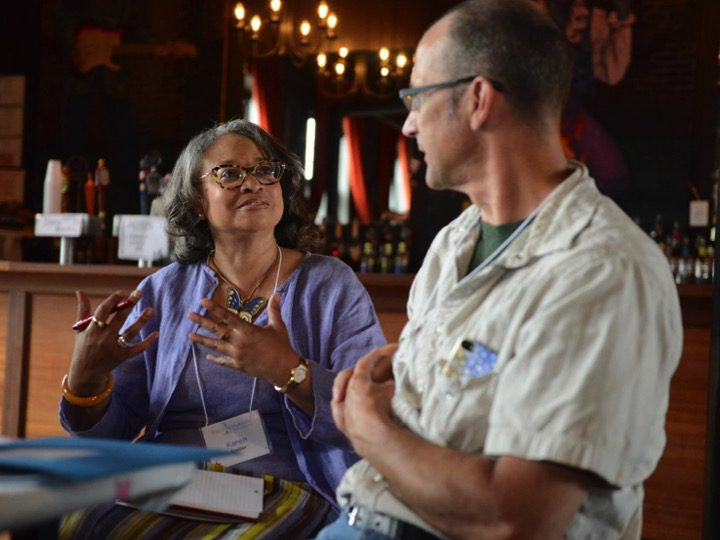
For the past five years, Food Solutions New England has been building a regional collaborative network organized to support the emergence and sustainability of a New England food system that is a driver of healthy food for all, racial equity, sustainable farming and fishing, and thriving communities. This network was formally launched with support of IISC in response to a shared sense that greater connection, trust, deep collaboration and innovation were needed across food system efforts throughout the region. To create this connectivity, we have engaged in a number of structural and procedural innovations, including creating an Ambassador Team to do network weaving and the 21 Day Racial Equity Habit Building Challenge, which will happen again this year from April 9-29.
Along the way, we have been witnessing some important boundary-crossing and new partnerships emerging. One example in particular stands out, stemming from a field visit a number of us did to a fishing community in the region to learn more about the challenges to and innovations among small scale fishermen. Our tour was organized by a network team member and community organizer of color who focuses on fisheries who has many deep connections in that community. One of the attendees of the tour was an older white man who does policy work in another state. Personality-wise, these two individuals are quite different, along with their chosen points of intervention in the food system. And yet on the heels of that tour, the organizer and the policy wonk became good friends and colleagues who continue to learn from one another and coordinate more around fisheries and policy analysis/development, creating new opportunities in and across their respective worlds. Read More
February 9, 2017
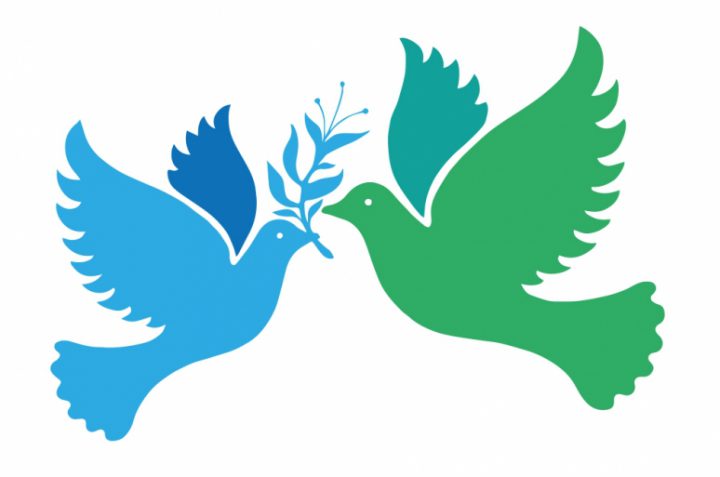
Last year we organised a Peacebuilders Workshop to create space for practitioners involved in peacebuilding work locally to come together and critically appraise our practice and identify the lessons learned about peacebuilding in conflict/post-conflict contexts. The discussion at that workshop calls to mind a number of important aspects of peacebuilding work that align with our approach at IISC.
Peacebuilding requires at its core the kinds of human principles or values which resonate with those required for other kinds of social change work. These include creativity, relationship building, and networks. Read More
January 6, 2017

I along with some other colleagues was recently approached by a networks researcher and thought leader about any emerging lessons and what we perceive to be current gaps in the “networks for social change” field around knowledge and practice. We were also invited to share any blog posts that speak to these lessons and growing edges. Below is the gist of the response that I sent, and I am curious to hear any reactions, extensions, etc.
Below are links to three blog posts that I would say speak to the growing edges in my own thinking and what I am seeing as important considerations for the field going forward. To summarize, these all have to do with how to get at deeper systemic change purpose and potential (which is not always the presenting purpose or initially perceived potential when networks form), and related to that, surfacing and working with issues of power, privilege and identity.
Read More
December 19, 2016

The following post recently appeared on the Food Solutions New England (FSNE) website. I have had the great pleasure and privilege of supporting FSNE for the past five years as a network design and development consultant, facilitator, and trainer. As we near the end of 2016, a year that has proven challenging to many, I continue to find some of my greatest hope in the work of this important and unique initiative, grounded in the tremendous commitment and generosity of its shared (net) leadership. This is not the first time that I have written about the work of FSNE. Other posts include: Distribution, Diversity, Dignity: Networking the “Business Case” for a Regional Food System; Leveraging a New (Food) System Narrative; Racial Equity Habit Building 2.0; Peeling Away Layers for Impact in Networks for Change; and Networks: A Love Story. The post below speaks specifically to the past year-plus of work identifying “leverage areas” for coordinated collective action …
In 2015, the Food Solutions New England (FSNE) Network Team began a year-long process to better understand how we could support the region in achieving the New England Food Vision. The Vision describes a future in which at least 50% of our food is grown, raised, and harvested in New England and no one goes hungry. It looks ahead to the year 2060 and sees farming and fishing as important regional economic forces; soils, forests, and waterways cared for sustainably; healthy diets as a norm; and racial equity and food justice promoting dignity and well being for all who live in New England. Read More
December 6, 2016
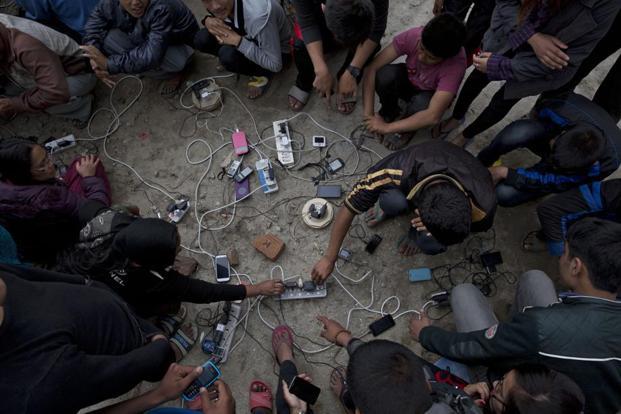
Over the recent Thanksgiving break, I had the opportunity to meet with friends of extended family members, a couple who are engaged in both disaster relief and community planning work. She is from Nepal and he is from the U.S., and together they relayed a story about their time visiting Nepal during the devastating earthquake of 2015.
The two of them were hiking in the mountains when the 7.8 magnitude quake struck. Shaken but not hurt, they made their way back to Katmandu as quickly as possible to check in on family members and then to offer their assistance to others. Originally assigned the task of loading water jugs on trucks, they then volunteered and were enlisted for their translation skills, and headed out to some of the hardest hit villages with international relief workers. Read More
October 12, 2016
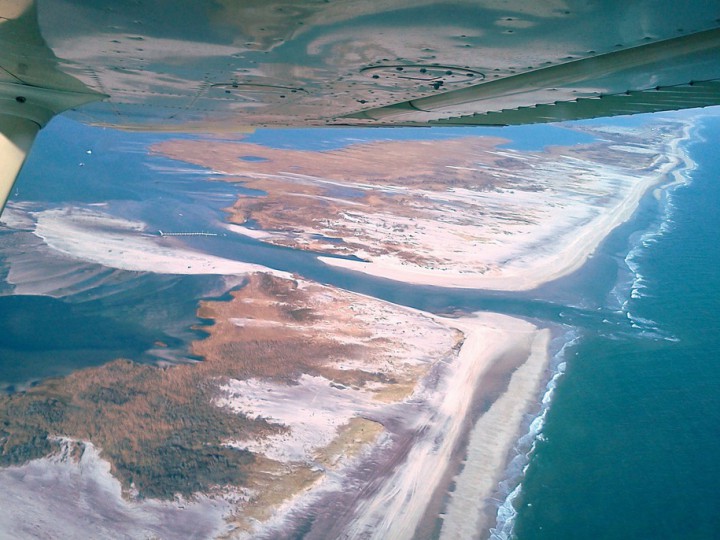
I can’t remember exactly where I saw the phrase recently, but I latched onto it. “Connections change what is connected.” So true. And this is a reason to seriously consider the power and promise of building networks for social change.
In our mainstream culture it seems that many people tend to look at things in isolation, without appreciating that context and relationship have so much to say about the nature of … well, everything. Think about the following examples: Read More
October 7, 2016
 In light of a recent conversation with Jana Carp, an academic who has studied the underlying principles of the “slow movement” and how they connect to sustainability, place-making and livabily, I am revisiting, revising and reposting the piece below. Jana and I were connected by a mutual colleague with the Fire Adapted Communities Learning Network, given our mutual interests in public engagement, community-building and sustainability (inclusive of justice), and had an interesting conversation about slowness and networks.
In light of a recent conversation with Jana Carp, an academic who has studied the underlying principles of the “slow movement” and how they connect to sustainability, place-making and livabily, I am revisiting, revising and reposting the piece below. Jana and I were connected by a mutual colleague with the Fire Adapted Communities Learning Network, given our mutual interests in public engagement, community-building and sustainability (inclusive of justice), and had an interesting conversation about slowness and networks.
At one point, the question came up as to whether networks might cut against slowness, especially when the emphasis is on rapid growth, diffusion, and trans-local connections. My thought at the time was that this certainly could be the case, and that is why it is important to think about both the breadth and depth dimensions of networks, as well linking different scaled networks (local, regional, global). The importance of networks for social change can certainly reside in their reach and rapid scaling. Their potential also resides in the nature and quality of connection, how deep the ties that bind are and what they help to create and circulate. And this brought me back to these reflections on how to think about “social velocity” in networks and collaborative work …
My friend Joel Glanzberg is a constant source of provocation and insight. The way he sees the world, through a living systems and pattern-seeking lens, is not only refreshing but unnerving in that it is evident how simultaneously critical and rare his perspective is. Joel is great at helping me and others to see beyond objects and structures to underlying patterns and processes, and how these are what animate living systems. Read More
September 13, 2016
Think like a network, act like a node.
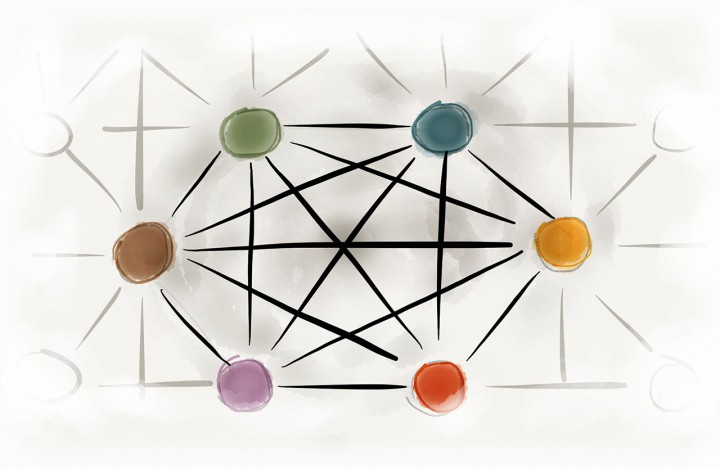 At IISC, we continue to emphasize that networks, not organizations, are the unit of social change. Part of the reason for this is that networks at their best are able to leverage what are known as “network effects.” These effects, as described by Madeleine Taylor and Peter Plastrik, include the following:
At IISC, we continue to emphasize that networks, not organizations, are the unit of social change. Part of the reason for this is that networks at their best are able to leverage what are known as “network effects.” These effects, as described by Madeleine Taylor and Peter Plastrik, include the following:
Rapid Growth and Diffusion
Through its myriad nodes and links, as well as the ongoing addition of participants and new pathways, a dense and intricate network can expand quickly and broadly. This can be critical for spreading information and other resources and mobilizing actors in ways that organizations simply cannot achieve.
Read More
August 17, 2016
 Networks, or webs, are core to living systems. Thinking and looking through a network lens can help people to understand the patterns and quality of connection that either make life possible and enable liveliness or threaten life and livelihood.
Networks, or webs, are core to living systems. Thinking and looking through a network lens can help people to understand the patterns and quality of connection that either make life possible and enable liveliness or threaten life and livelihood.
Chilean biologists Humberto Maturana and Francisco Varela, in their work on “cognition” in living systems, propose that there is no knowing outside of connecting or relating.
“The world as we know it emerges out of the way we relate to each other and the wider natural process.”
In other words, according to Maturana and Varela, it is through connecting and relating that “a world is brought forward.” The quality and qualities of that world depend, in large part, upon how people and other elements of living systems connect and relate to one another. Read More
August 9, 2016
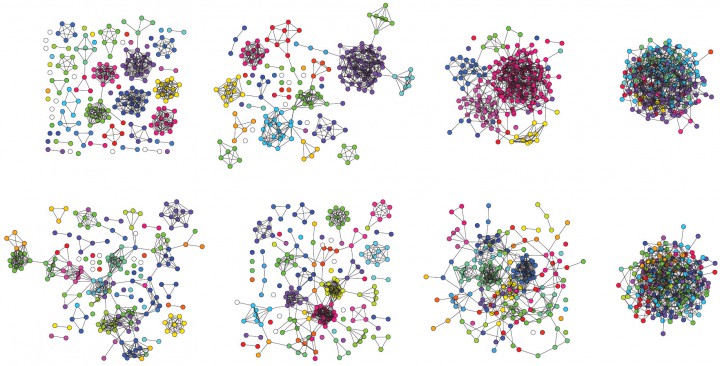
Social change networks are complex, compared with other human organizational forms; they are not so easily controlled, directed or predicted. And that is as it should be, especially when dealing with real life diversity and uncertainty. This can cause some anxiety on the part of those who would like to be able to better control for outcome and process and may not be very comfortable with emergence and self-organization. But these are the life blood of complex networks, part of their intelligence and effectiveness, even as people may struggle to wrap their heads around the full picture of what is happening. That’s the way life works.
That said, experience suggests that there is an important effort to be made and role to be played in tracking (even if imperfectly and incompletely) the unfolding story of a social change network over time. This is especially important for those in pursuit of hard evidence of effectiveness and/or some kind of guarantee that there is return on one’s investment of time and other resources. I have noted previously and continue to be struck by the fact that seeing signs of network impact can indeed be difficult, perhaps because of a kind of conditioning around what constitutes “action” and “success.” Furthermore, the pace of life can cut against an appreciation for what is moving right before one’s eyes in fairly nuanced and perhaps more measured ways. Read More
August 1, 2016

I recently re-read portions of Limits to Growth: The 30 Year Update by Donella Meadows, Jorgen Randers and Dennis Meadows. This second update to the original 1972 report from the Club of Rome affirms that current business-as-usual resource usage globally has our socioeconomic systems headed toward collapse shortly after the year 2050. The update reiterates the necessity of taking the impending crisis seriously and mobilizing quickly to adopt strategies such as:
While all of this serves as a strong wake-up (or stay awake) call, what most caught my attention was the concluding chapter, where the authors move from discussion of the technical fixes required to get us on the right track to a serious appeal to more adaptive approaches. Read More







 In light of a recent conversation with
In light of a recent conversation with  At IISC, we continue to emphasize that
At IISC, we continue to emphasize that 


